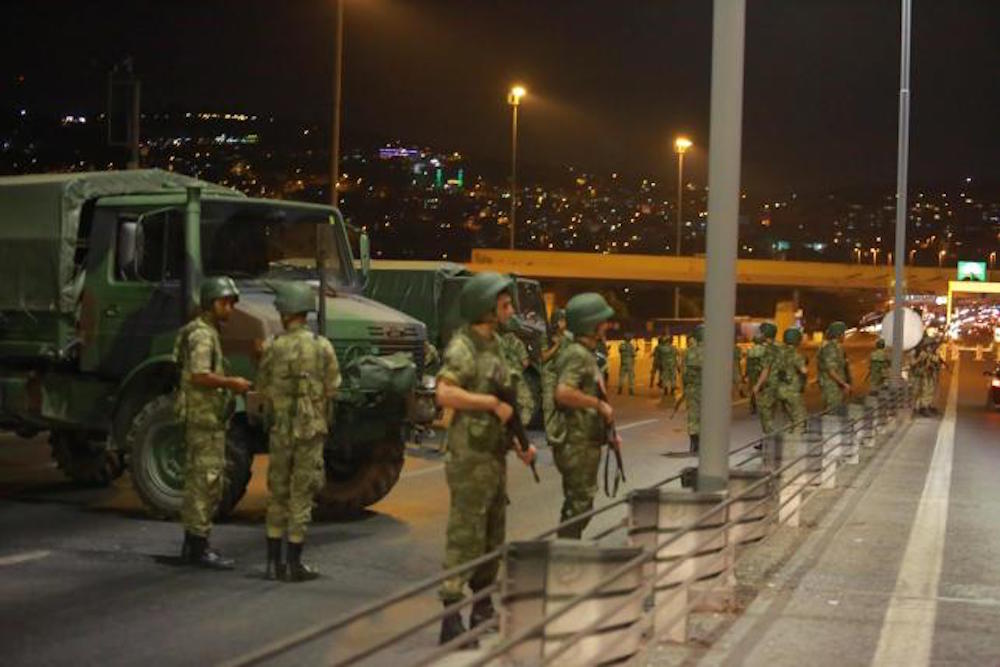Turkish military stand guard near the the Taksim Square as people wave with Turkish flags in Istanbul.
Turkey’s military said late on Friday it had seized power but President Tayyip Erdogan vowed that the attempted coup would be put down.
If successful, the overthrow of Erdogan, who has ruled Turkey since 2003, would be one of the biggest shifts in the Middle East in years, transforming one of the most important US allies while war rages on its border. Even if it fails, the coup attempt could destabilise a pivotal country in the region.
“We will overcome this,” Erdogan said, speaking on a video call to a mobile phone held up to the camera by an announcer on the Turkish sister station of CNN. He called on his followers to take to the streets to defend his government and said the coup plotters would pay a heavy price.
An official said Erdogan was speaking from Marmaris on the Turkish coast where he was on holiday. Erdogan said he would swiftly return to Ankara.
Prime Minister Binali Yildirim and other senior officials said the elected government remained in office. Yildirim called the coup attempt a terrorist act by gangs and illegal formations.
Television images showed scores of people, some waving Turkish flags, gathered in major squares in main city Istanbul and capital Ankara to show support for the elected government. Gunfire broke out in both cities.
Warplanes and helicopters roared over Ankara and explosions could be heard there. State-run news agency Anadolu said military helicopters had fired on the headquarters of the intelligence agency. Journalists saw tanks open fire near the parliament building in Ankara, which they had surrounded.
Airports were shut, access to Internet social media sites was cut off, and troops sealed off the two bridges over the Bosphorus in Istanbul, one of which was still lit up red, white and blue in solidarity with victims of the Bastille Day truck attack in France a day earlier.
Soldiers took control of TRT state television, which announced a countrywide curfew and martial law. An announcer read a statement on the orders of the military that accused the government of eroding the democratic and secular rule of law. The country would be run by a “peace council” that would ensure the safety of the population, the statement said.
TRT later went off the air.
Anadolu said the chief of Turkey’s military staff was among people taken “hostage” in the capital Ankara. CNN Türk also reported that hostages were being held at the military headquarters.
Not a tinpot coup
A senior EU source monitoring the situation said: “It looks like a relatively well orchestrated coup by a significant body of the military, not just a few colonels. They’ve got control of the airports and are expecting control over the TV station imminently. They control several strategic points in Istanbul.
“Given the scale of the operation, it is difficult to imagine they will stop short of prevailing. It’s not just a few colonels,” the source repeated.
One European diplomat was dining with the Turkish ambassador to a European capital when guests were interrupted by the pinging of urgent news on their mobile phones.
“This is clearly not some tinpot little coup. The Turkish ambassador was clearly shocked and is taking it very seriously,” the diplomat said as the dinner party broke up. “However it looks in the morning, this will have massive implications for Turkey. This has not come out of nowhere.”

Turkish military block access to the Bosphorus bridge, which links the city’s European and Asian sides, in Istanbul. (Reuters)
US Secretary of State John Kerry and Russian Foreign Minister Sergei Lavrov, speaking jointly after talks in Moscow, both said they hoped bloodshed would be avoided. The US State Department said Americans in Turkey should shelter indoors. Other countries issued similar advice.
Turkey, a NATO member with the second biggest military in the Western alliance, is one of the most important allies of the United States in the fight against Islamic State, which seized swathes of neighbouring Iraq and Syria.
Turkey is one of the main backers of opponents of Syrian President Bashar al-Assad in that country’s civil war, host to 2.7 million Syrian refugees and launchpad last year for the biggest influx of migrants to Europe since World War II.
Celebratory gunfire erupted in Syria’s capital Damascus as reports emerged that Erdogan had been toppled. People took the streets to celebrate there and in other government-held cities.
Turkey has been at war with Kurdish separatists, and has suffered numerous bombing and shooting attacks this year, including an attack two weeks ago by Islamists at Istanbul’s main airport that killed more than 40 people.
In an earlier statement sent by email and reported on TV channels, the military said it had taken power to protect the democratic order and to maintain human rights. All of Turkey’s existing foreign relations would be maintained and the rule of law would remain the priority, it said.
After serving as prime minister from 2003, Erdogan was elected president in 2014 with plans to alter the constitution to give the previously ceremonial presidency far greater executive powers.
Turkey has enjoyed an economic boom during his time in office and has dramatically expanded its influence across the region. But opponents say his rule has become increasingly authoritarian.
His AK Party, with roots in Islamism, has long had a strained relationship with the military and nationalists in a state that was founded on secularist principles after World War I. The military has a history of mounting coups to defend secularism, but has not seized power directly since 1980.